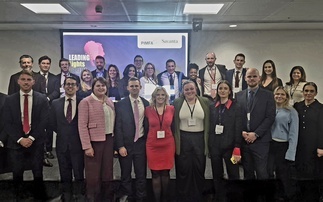If you are a regulator or legislator in the UK or Europe, you will be passing more laws and creating more rules around the marketing, sale and purchase of insurance products including protection.
With recent events (just think PPI) and a new regulator driving an increasing understanding of insurance-related conduct risks - not least the impact of properly understanding human behaviours around decision making - Behavourial Economics, one way or another, it is going to be an increasingly busy time for all of us.
The only predictable constant will be change - and of course, change is uncomfortable for many. However, with change comes opportunity, and as the Chinese proverb states: "when the winds of change blow, some build walls, others build windmills".
However for either to be true, you first have to have your weather vane to identify the wind is blowing, and in which direction, then the necessary materials with which to build whichever you choose.
And therein lays the issue for all intermediaries with a significant or specialist interest in protection insurance.
In our world, the watcher of the weather vane and then the facilitator for the construction of market walls or windmills is often the work of trade associations.
Trade associations are an effective way of pooling resources and expertise, and a way to achieve cut-through with industry stakeholders and opinion formers.
But at the moment there just doesn't seem to be a trade body or entity tuned into and focused on representing you - the Protection specialist intermediary - and your specific interests.
Now by default, some of the actions of all ‘linked' trade bodies could have a positive impact on you, in some way acting purposefully or un-purposefully in your interest in the normal course of their activities.
At any one time it is possible that the Association of British Insurers (ABI), the Association of Professional Financial Advisers (APFA), the Association of Mortgage Intermediaries, the Association of Medical Insurance Intermediaries, the British Insurance Brokers Association (BIBA) or the Association of Travel Insurance Intermediaries (ATII) could be, by chance, acting in your interests.
But this means leaving a lot to luck or fortune - and that represents too much of a risk. It is too important to leave such matters to chance.
Protection insurance intermediaries need some ‘thing' to represent their interests amongst all this change, to work with the provider's trade body and those representing consumers.
So who is it or what is that might achieve that? As in any industry segment, in protection there are the outspoken few who, from time to time, appear to act as a mouthpiece for the industry.
These few are necessary to develop momentum, but for any association to get off the ground it has to deliver to some pretty fundamental needs. To be representative for example, for which you need consensus, it will also need to develop the resources necessary for organisation.
Entrepreneurs and business people often initiate such bodies, but few have the time, the inclination, appetite and other characteristics necessary to run them over any meaningful period.
Gaining consensus, carrying a majority, developing collaborative initiatives is not only a full-time job, it would test the patience of a saint. The job demands an entirely unique mix of personality type and agility.
Right now there is a lot of talk in the market on the subject, some acting, some researching. Where this might all end up isn't obvious, but what is evident to me is that the voices we hear are not yet clear on all the issues.
They are not yet coherent and do not yet carry a mandate from the masses of market participants.
Now all associations are not the same of course and they certainly are not when it comes to intermediaries. You just need to take a look at their websites to get an idea of the scale of their interests, representation and resources.
Looking around, it is clear that all the current associations are well intentioned, have achieved notable successes and are clearly valued by their subscription-paying members.
But given the array, it can not be the case that they all hold the same importance for external stakeholders and by this token they cannot have the same access and influence.
Each inevitably carries a different weight.
Some are more specialised than others, being either mono-product line or focused specifically on advice-related issues. It appears, on reflection, to be a world of intermediary associations which has grown up on the back of specialist interests, issues and initiatives, rather than planned in any market-wide strategic way.
And this is something perhaps protection intermediaries should take note of before they decide what they want.
As an outsider (although some sometimes an insider - more than half my career was spent as an intermediary) it does appear that resources may not be being effectively pooled for maximum impact.
One could hazard a guess that, through fragmentation, each association must individually be less than the sum of the parts if they were combined and somehow banded together.
It is a similar situation to the one in the film ‘The Life of Brian': when Brian is confronted on which group he should join to take on the Romans, the ‘People's Front of Judea' or the ‘Judean People's Front' (who of course hate each other).
Nobody is saying for one minute that AMI, AMII, ATII, APFA of BIBA hate each other - they are sure to have great relationships, are full of mutual respect and probably collaborate, or at least communicate on lots of important matters. But to 'outsiders' it comes across as sub-optimal in terms of influence and resources.
It is therefore reasonable to suggest that, at this stage in the intermediary association lifecycle, the last thing anyone needs is an Association of Protection Insurance Intermediaries (APII) to sit alongside all of the others listed above.
This observation may not be seen as particularly helpful to those planning an association to represent the interests of protection insurance intermediaries, but ultimately if you want to see a great outcome, now is the time to speak and maybe be outspoken.
Studying each of the association models might give people some ideas on how they may want to organise themselves (or not). However, under the current constructs, intermediaries' voices are not carrying as far as they might - simply because thus far they have not organised themselves into a 'super-group'.
The ABI is a good example of a well constructed 'super-group', representing diverse yet often aligned interests, with their structure of board and board committees covering investments, general insurance, long term savings and life insurance businesses.
Perhaps it is time for a new 'super-group' to represent intermediary interests in the same way, squeezing in advisers, non-advisers and all the various product lines? Perhaps it is time for the Association of Professional Financial Mortgage & Insurance Intermediaries (APFMII) or more simply the Association of Professional Intermediaries (API) to come up with a similar corresponding structure to that of the ABI?
Whatever you think of the ABI, in many ways it is a very effective association for its members. As an organisation its business is to be well organised, well connected and appropriately resourced, representing the interests of a large number of product providers across various market segments, which are actively involved in every type of distribution you can possibly imagine.
It is not sure that intermediary representatives will be able to set aside their own preferences to make anything like API happen, but they should at least think about it and perhaps even talk about it.
The consequences are of course for the membership to ultimately experience, however for those pleading a lack of resources or influence then maybe, just maybe, now is the time to take stock and think a little more strategically about 'what if', rather than 'what is'.
Everyone wants a vibrant, strong, engaged sector, well represented in all the important and urgent developments. So why is it only intermediaries who aren't organised to participate fully, coherently and fully effectively in a powerful, valuable, dynamic and increasingly ‘under the microscope' insurance segment?
Government is, consumer representatives are, the regulator is, as are insurers. Intermediaries represent the missing link in the chain.
It is to be hoped that the stars align and that those with the very best intentions succeed in developing an appropriate voice. Perhaps restructuring all organisations into one is just too much to hope for, but as my head of year scrawled (in red ink) across my last ever end of year school report "hope springs eternal".
Richard Verdin is managing director, protection at Aviva UK












